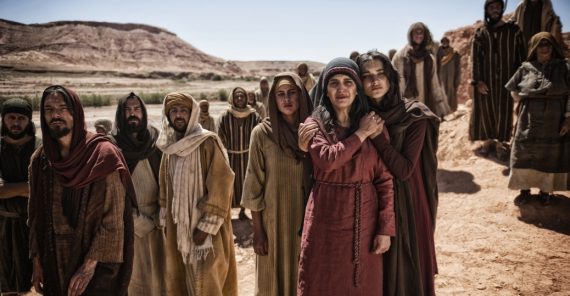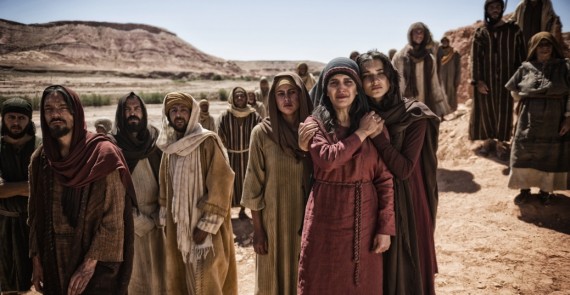I originally went to college to be a Mechanical Engineer. I have always enjoyed tinkering with things, trying to learn how they work so that I can understand what is happening, and either fix or improve whatever I am working on.
As a result of my engineering background, I often approach my study of Scripture and theology in the same way. I try to understand things and how they work, so that I can attempt to explain them more clearly to others.
This is also true when it comes to the inner workings of faith. For me, as a theologian and Bible scholar who has an engineering background, it is not enough for the Bible to call me to believe … I want to know how belief works … how faith works … so that I can not only believe, but also know why I believe, and how to help others believe as well.
So the following article might be a bit technical for some people as I try to explain how faith works, but I do provide an illustration for how faith works to help it make sense.
The reason I want to explain faith this way is because there is so much misinformation out there about faith. People write emails to me all the time, and when I teach in live settings, I get questions and objections all the time, about how a person can know if they have really believed, or if they have believed enough.
In seeking to answer these questions, I first had to figure out what faith is and how faith works.
In a previous study, we learned that Faith is defined as a certainty or conviction that something is true.
 Some do not like the idea of faith as certainty. For example, author and pastor Greg Boyd once criticized the idea that faith is certainty by comparing faith to a house of cards.
Some do not like the idea of faith as certainty. For example, author and pastor Greg Boyd once criticized the idea that faith is certainty by comparing faith to a house of cards.
Greg Boyd argued that if we believe that our faith must be certain, then any time a challenge or question comes along which threatens this certainty, our entire belief system comes tumbling down like a house of cards.
I agree with Greg Boyd that we cannot have a “house of cards” faith in which all of our beliefs stand or fall together. But how can we avoid this if faith truly is defined as certainty?
The solution is to use a better analogy.
Rather than thinking about faith as a house of cards, a better analogy is to think about our network of beliefs as a giant Excel spreadsheet (I first heard this analogy from Dr. Dave Anderson, pastor in The Woodlands, TX).
Faith as an Excel Spreadsheet
If you are not familiar with a Microsoft Excel spreadsheet, it is an accounting tool which contains a series of rows and columns. At the intersection of each row and column, there is a “cell.” This cell can contain a bit of data.

For example, a cell could contain a number or some sort of mathematical calculation. Spreadsheets are usually set up so that as you enter data into the cells, it automatically makes calculations in other cells.
Advanced Excel spreadsheets might contain thousands of cells set in a way so that a change in one single cell might affect the numbers or calculations in thousands of other cells. Each little change can have a ripple or cascading effect throughout the rest of the spreadsheet.
It is helpful to think about our network of beliefs in a similar way. We can think of our belief system as a giant Excel spreadsheet.
But rather than numbers and math calculations, each cell contains an individual fact. Since there are a nearly infinite number of facts, this giant spreadsheet has a nearly infinite number of cells.
“The sky is blue” is in one cell, “I exist” is in another, and “There is a God” is in third.
Furthermore, just like on any complex Excel spreadsheet, nearly all the cells are interconnected by functions, so that when one cell changes, it causes a cascading, rippling effect throughout the rest of the spreadsheet.
If we think about our beliefs in this way, we can see that when it comes to each individual statement, we can either believe it or disbelieve it. We can either know it to be true, or we can doubt that it is true. We can either assent and agree with the statement in the cell, or dissent and disagree.
While we will be reasonably certain about several statements on this spreadsheet, we will be either ignorant or uncertain about the vast majority of statements. And as we change what we think about any particular fact, this change will have a cascading, ripple effect through the related and connected cells on the spreadsheet of beliefs.
What this means is that as we come to believe new ideas, some of the beliefs which have not changed for decades might need to be reconsidered in light of new evidence. Therefore, while we can have reasonable conviction or confidence about the accuracy of any single cell (or belief), we nevertheless know that the content of that cell is based upon the ideas of other related cells, about which we are less confident.
To put it another way, the complete confidence of one belief in one “cell” can be based upon less confident beliefs of other “cells.”
This way of thinking about faith provides adequate responses to many of the objections that some pastors and theologians have to the concept of faith as certainty. Many who criticize the idea of “faith as certainty” seem to think that the entire system stands or falls together.
But this is not the true nature of faith. When we think about our system of beliefs as a giant Excel Spreadsheet, we see that it is impossible for the entire system of faith to collapse.
Instead, our beliefs constantly shift and change as additional information is presented to us, so that new beliefs are turned “On” in the spreadsheet while other beliefs are corrected and turned “Off.”
Best of all, with each cell that changes you gain a spreadsheet that is more accurate than it was before. One of these truths you discover quite soon (if you allow God to teach it to you), is that God does not require a spreadsheet of beliefs that is free of error.
 Quite to the contrary, He desires a spreadsheet of beliefs that is constantly shifting and changing as we bring our life and thoughts into conformity with Jesus Christ and the revelation of Scripture. But this is a process, a journey, or an adventure that will last a lifetime (I suspect this adventure will last into eternity as well, as we forever unravel the infinite mysteries of glorious vistas of God), and so God is patient with us as we fill out our spreadsheet of beliefs with Him by our side.
Quite to the contrary, He desires a spreadsheet of beliefs that is constantly shifting and changing as we bring our life and thoughts into conformity with Jesus Christ and the revelation of Scripture. But this is a process, a journey, or an adventure that will last a lifetime (I suspect this adventure will last into eternity as well, as we forever unravel the infinite mysteries of glorious vistas of God), and so God is patient with us as we fill out our spreadsheet of beliefs with Him by our side.
Viewing faith in this way helps you see that although one changed belief often does cause a change in many other related beliefs, your entire belief system never collapses like a house of cards. It may initially feel like this has happened, but by taking a deep breath and examining the new evidence you have been given, you will discover that most of your beliefs remain intact.
You will also discover that you now have a better and more accurate belief system through which to view God, Scripture, yourself, others, and life in general.
The Spreadsheet at Work
Let us briefly see how this works with the truth claim that “Jesus gives eternal life to those who believe in Him for it.”
I believe this truth with absolute certainty. I have many reasons for this belief, all of which reside in their own individual cells.
For example:
- I believe that there is a God, and that only He gets to decide who has eternal life with Him and how they get it.
- I furthermore believe that Jesus is God, and so He knew what He was talking about when He offered eternal life.
- I also believe that the Bible can be trusted as an authoritative revelation from God.
- I believe that I have properly understood the simple promises of Jesus to give eternal life to those who believe in Him (cf. John 3:16; 5:24; 6:47).
- I believe that Jesus does not lie.
- I believe that I am not able to earn or work for my eternal life on my own, because I can never be good enough to qualify for God’s perfect standard of complete righteousness.
If all these things are true, as I believe they are, then it is completely logical to be convinced and persuaded that Jesus gives eternal life to those who believe in Him for it. And since I believe in Jesus, I know that I have eternal life.
But if any of these beliefs were to change, then this would likely cause me to stop believing that Jesus gives eternal life to those who believe in Him for it.
If I stopped believing that God existed, or that the Bible accurately records the teachings of Jesus, I might stop believing in Jesus for eternal life.
However, the more I study and learn, the more evidence I find that supports all these beliefs. I now know too much to turn back on any of these truths and cannot imagine a situation that would cause me to reject them.
The more I study and learn, the more beliefs I gain, each of which further supports the belief that Jesus gives me eternal life.
Is it possible that the authors of the Gospels failed to accurately record what Jesus said? It’s possible, but not likely, so I don’t believe this.
Is it possible that those who copied the Bible and passed it down through the generations made a mistake? It’s possible, but manuscript evidence proves that this is unlikely, and so I don’t believe it.
Is it possible that I have incorrectly understood what Jesus said and meant? Well, this is the most likely factor that could cause me to stop believing in Jesus. But since the teachings from Jesus about how to receive eternal life are some of the simplest teachings He gave (even a child can understand and believe these promises), I do not think this is likely, and therefore, I believe I have properly understood His promises.
Since my belief in Jesus for eternal life is based on a large number of other reasonable beliefs, if any one of these other beliefs were to change, there would indeed be a cascading effect of changing beliefs. As numerous beliefs changed, it might indeed feel like Greg Boyd’s house of cards, as if everything I thought I knew was tumbling down around me.
However, note that there are many beliefs that can safely change without affecting my belief in Jesus whatsoever.
 My belief in Jesus is not affected at all by belief (or lack thereof) that Methuselah lived to be 969, that the universe was created in seven 24-hour days, or that Jesus is going to return in the future to slaughter all His enemies with a reign of terror and blood (I actually don’t believe this).
My belief in Jesus is not affected at all by belief (or lack thereof) that Methuselah lived to be 969, that the universe was created in seven 24-hour days, or that Jesus is going to return in the future to slaughter all His enemies with a reign of terror and blood (I actually don’t believe this).
These beliefs can change back and forth numerous times (as they have over the years), but such changes will not cause my entire belief system to come tumbling down like a house of cards.
Now the same sort of belief changes can be observed even with beliefs that are not “theological.” The “network of belief” concept applies to any individual belief.
For example, I believe the sky is blue because I believe I know what “blue” is, and because I believe my eyes are not deceiving me. I furthermore believe that I truly exist in this world rather than in a dream world or computer simulation as in “The Matrix.” Since all of these are reasonable beliefs, I can confidently believe (know) that the sky is blue.
However, if someone could persuade me that I did not exist, or that this world was a computer simulation, or that I have color-blindness and so do not accurately understand “blue,” then I might realize that I am wrong about the blueness of the sky.
But until these other beliefs change (which is extremely unlikely), I am fully confident that the sky is blue. (As a side note, I now actually believe that the sky is violet. I explain why in my book on faith.)
Let us consider an example from Scripture where we see this concept of spreadsheet faith being played out in real time.
An Example from Scripture
In John 11, Lazarus has died, and Jesus goes to Bethany to grieve with Mary and Martha. When Jesus arrives, Martha comes out to meet Him on the road and says, “Lord, if you had been here, my brother would not have died” (John 11:21).
Jesus responded by saying, “Your brother will rise again” (John 11:23).
So Mary says, “I know that he will rise again in the resurrection at the last day” (John 11:24).

Do you see what is going on here? Each of these statements is a factual statement that exists on Martha’s spreadsheet of beliefs. She believes that if Jesus had been present, Lazarus would not have died. Remember, they sent word to Jesus when Lazarus was sick, but he delayed in going to them until after Lazarus had died. So Martha is chiding Jesus a bit. She believes that Lazarus died because Jesus didn’t show up when she wanted Him to.
But then Jesus makes another factual statement. He says, “Your brother will rise again.” Now, does Martha believe this? She does. For she goes on to say, “Yes, I know, believe, agree that he will rise again … but on the future day of resurrection.”
Based on these beliefs, Jesus goes on to teach her some new ideas about Himself. He is going to make some factual statements to see if they are turned “On” or “Off” in her spreadsheet of beliefs.
So Jesus says, “I am the resurrection and the life. He who believes in Me, though he may die, he shall live. And whoever lives and believes in Me shall never die” (John 11:25-26). Jesus makes three factual statements here. Each one is a truth claim about Jesus, and each one is dependent upon the others, and dependent upon what Martha has already stated about the resurrection. Jesus is inviting her to build upon her previous beliefs and add some new beliefs to them.
Jesus claims that (1) Resurrection and life resides in Him, (2) that those who die in Him will also live in Him, and (3) that who live and believe in Him will never die.
After Jesus makes these three factual statements, He says, “Do you believe this?”
Notice how Martha responds. She doesn’t say, “Yes, Lord, I believe these three things. I believe that (1) Resurrection and life resides in You, (2) that those who die in You will also live in You, and (3) that who live and believe in You will never die.”
She does not restate the beliefs and affirm her agreement with them.
Instead, she says something that has confused a lot of people over the years. She says, “Yes, Lord, I believe that You are the Christ, the Son of God, who is to come into the world.”
Lots of people read these words and get confused. They see Martha state her agreement with Jesus, but then she seems to say something back to Him that is not a restatement of what Jesus just said. She doesn’t state her agreement by summarizing what Jesus just said; instead, she states her agreement by stating her belief in something else entirely.
So people get confused by this and say, “Well, maybe to believe that Jesus is the resurrection and the life is the exact same as believing that Jesus is the Christ, the Son of God.”
And while we could say that the two concepts are related, the two concepts are not identical beliefs. That is, to say that Jesus is the Christ is not the same thing as saying that Jesus is the resurrection and the life. We know this for a variety of reasons. There are lots of people in the days of Jesus who believed that He was the Christ, but did not believe that He could raise people from the dead, or even that He Himself would be raised from the dead.
Furthermore, there were many people throughout biblical history who were thought of as “Messiahs” or “Christs” (that is, deliverers, saviors), but nobody ever thought that these people could raise others from death.
So since believe that Jesus is the Christ is not the same thing as believing that Jesus is the resurrection and the life, why does Martha answer the way she does?
She answers the way she does because she is saying that because Jesus is the Christ, then she trusts and accepts whatever else Jesus says, including these recent three statements about the resurrection.
To put it another way, Jesus makes three truth claims about Himself, and then asks Martha if she believes what He has said. These are new ideas to her, and she has never been told these ideas before.
So she can either accept, acknowledge, and agree with what Jesus has just said, thereby believing His words, or she can disagree with Him, thereby not believing.
But since Martha already knows and believes something else on her spreadsheet of faith, namely, that Jesus is the Christ, the Messiah, the son of God, this therefore causes Martha to realize that everything Jesus says can be trusted and accepted.
Therefore, because of her belief in Jesus as the Christ, Martha also believes these new statements about Jesus, that He is the resurrection and the life, that those who die in Him will live again, and that those who live in Him will never die.
Do you see? A cell on her spreadsheet of faith which said “Jesus is the Christ” was turned “On.” As a result of this cell, another cell on her spreadsheet of faith which said, “Everything Jesus says is true” was also turned on.
So when Jesus comes along and says something she has never heard or thought of before, and then Jesus asks her if she believes these new ideas, it does not take her long to turn these cells on as well. She didn’t fully understand the ramifications of what Jesus was saying, but she did know that Jesus was saying it, and that because He was the Christ, His words could always be trusted and believed.
So she believed Him.
Then, of course, to provide further support and proof that her believe in Him was well-founded, Jesus went and raised Lazarus from death.

This is just one example of how the network of beliefs that exists on our spreadsheet of faith works together to consider new ideas and incorporate new beliefs. We see it work very quickly with Martha, but it doesn’t always move this fast. Sometimes the process is much slower.
But regardless, I hope that with this illustration of faith, it can help you understand how faith works, and how you can come to consider and accept the various truth claims that bombard you each and every day.
No one is asking you to take a leap of faith. Each belief is built upon others that you might or might not have. Also, your faith is not a house of cards that can be knocked down by a passing wind of doubt or a troublesome question. Instead, your faith is a vast network of individual beliefs that are constantly moving, shifting, changing, and developing over time. It is not something to be afraid of, but can be enjoyed and anticipated as we continue to follow Jesus wherever He leads.
Now, I imagine that this illustration of faith might raise some further questions. For example, if this is how to think about faith, then what does the Scripture mean when it refers to great faith or little faith? How do these terms fit in with this concept of faith as a network of beliefs?
We will consider this question in the next study.
 Understanding the Gospel requires us to properly understand the key words and terms of the Gospel. Take my course, "The Gospel Dictionary" to learn about the 52 key words of the Gospel, and hundreds of Bible passages that use these words.
Understanding the Gospel requires us to properly understand the key words and terms of the Gospel. Take my course, "The Gospel Dictionary" to learn about the 52 key words of the Gospel, and hundreds of Bible passages that use these words.
This course costs $297, but when you join the Discipleship group, you can to take the entire course for free.




 This is a guest post by Doreen Frick. Doreen is the daughter of prophecy writer Salem Kirban, and was most influenced by the people in her life who showed her Christ in the practical ways. She and her husband, Wes, have four “kids” and 11 grandkiddies.
This is a guest post by Doreen Frick. Doreen is the daughter of prophecy writer Salem Kirban, and was most influenced by the people in her life who showed her Christ in the practical ways. She and her husband, Wes, have four “kids” and 11 grandkiddies.
 Jesus was so succinct, so powerfully textual and welcoming she was already falling for Him before he got to that part, but just as quickly as she learns the truth she goes running to tell all the men in the village she’s met a Man who told her everything she ever did. He’s gotta be the One, doesn’t He? And don’t you know all the men come right out to meet this Man who spoke with this woman and who knew all things. As I read this part the picture of a bunch of fairly curious and perhaps a little worried townspeople rushing out to see what the commotion is all about comes to me and then I smile when it’s recorded how they all believed Him. Not because she told them, but because they heard Him for themselves.
Jesus was so succinct, so powerfully textual and welcoming she was already falling for Him before he got to that part, but just as quickly as she learns the truth she goes running to tell all the men in the village she’s met a Man who told her everything she ever did. He’s gotta be the One, doesn’t He? And don’t you know all the men come right out to meet this Man who spoke with this woman and who knew all things. As I read this part the picture of a bunch of fairly curious and perhaps a little worried townspeople rushing out to see what the commotion is all about comes to me and then I smile when it’s recorded how they all believed Him. Not because she told them, but because they heard Him for themselves.
 Here is how I have usually read John 11:39-44:
Here is how I have usually read John 11:39-44:
